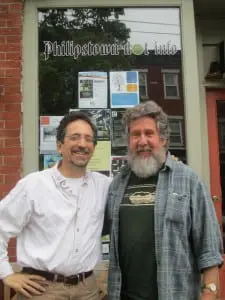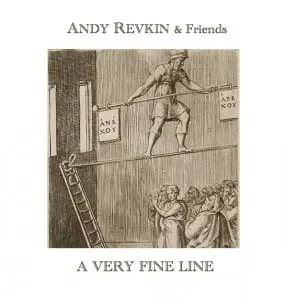A Very Fine Line reflects dexterity and incapacity
By Alison Rooney
Evolution: one of the things Andy Revkin focuses on both as a journalist specializing in the environment, and away from the page, with many spins around the musical sun. His latest orbit has taken him from sometime-band member to front-and-center recording artist with the release of his first CD, A Very Fine Line, its title a reflection of the “very fine line between dexterity and incapacity.”
Revkin traversed that fine line, to and from, after experiencing an unanticipated stroke a few years ago, temporarily rendering his right hand unusable. The taking stock of one’s life which inevitably comes from such a crisis led him back to the thing he enjoyed most: creating music which hearkened back to the wide-ranging musical influences of his coming-of-age years, tempered with his life now in the Hudson Valley.
Revkin grew up in a musical Rhode Island household in which both of his parents enjoyed singing “folk songs and sea songs learned through their shared love of sailing and my dad’s time in the Merchant Marine,” Revkin said. “I was surrounded by the joy of music.”

Acquiring a beat-up guitar at age 17 (he’s still got it), he repaired it as best he could and started performing at coffeehouses while at Brown University. A peripatetic period followed, as a fellowship offered him the opportunity to travel to the South Pacific working on a project based on man’s relationship to the sea.
From there he embarked on a two-and-a-half-year-long stretch working on a sailboat, which plied the waterways of the world. The photos and notes he took along the way fueled his desire to become a journalist and led to his enrolling at Columbia University School of Journalism upon his eventual return.
Settling into post-graduate adult life, Revkin began his editorial career as a copy editor at Science Digest and put down roots in Brooklyn, before moving to Garrison in 1991, soon after writing his first book. It was a desire to start exploring the Hudson that brought Revkin upriver. He gravitated to the Beacon Sloop Club, lured by both its environmental, riverine focus and its first Friday of the month music, shaped by its foremost founding member, Pete Seeger.
Reaching for his by-that-time collection of guitars plus mandolins, he began performing more often, playing at Saunders’ Farm barn dances and at the late, lamented Guinan’s. As he made the train platform acquaintance of some of the coterie of professional musicians who call Garrison home, a band was formed: composer and pianist Art Labriola; arranger, producer and established drummer Jerry Krenach; and Pete Rundquist, jingle composer and guitarist.

Uncle Wade’s rule of thumb, according to Revkin, was unlike the key principle of most bands. “We agreed to mainly play the instrument we were least good at. It was a way to get together playing music we enjoyed, leaving our egos at the door.” Revkin says that now, just a decade or so later, the platform encounters wouldn’t have happened, because “now they’re all digital, working from home, leaving less of a footprint … .”
Uncle Wade began as bands often do, with jam sessions, which then led to local performances of what they called “simple music for complicated times,” or, in his one-word description: “twangy.” Locally they turned up at benefits and at the numerous outdoor mini-festivals that dot the calendar year in, year out, nearby.
During this time, Revkin began to get more serious about music overall, visiting Nashville several times, soaking in the songwriting tradition there. But Uncle Wade turned out not to be the avenue to putting out a record, as the other members, working in music professionally, “didn’t want it to feel like work.”
All of this might have remained the status quo had Revkin not experienced his stroke, which affected the dexterity in his fingers. “It showed me clearly what we take for granted,” he says, “and I realized I’d better actually record my music.” Handily, there are an abundance of professional studios in this area, and, last February, Revkin headed to Joe Johnson’s.
Working with older and newly-written material, including a few existing recordings, Revkin and Johnson took “quite a bit of time, working on things in bits and pieces, starting with basic, separate, voice and guitar tracks, then asking ‘what now?’ and coloring them. With the existing recordings we peeled them back to basics so they are essentially rebuilt.” The rest were recorded at the studio.
 Then, in Revkin’s description, “the fun process began.” With the song Arlington (about the growing lack of burial space there) for example, they wanted an “echo-y trumpet.” He asked local trumpeter Ben Neill if he’d contribute. Neill’s playing gives it, says Revkin, “a demonstrative trumpet voice.
Then, in Revkin’s description, “the fun process began.” With the song Arlington (about the growing lack of burial space there) for example, they wanted an “echo-y trumpet.” He asked local trumpeter Ben Neill if he’d contribute. Neill’s playing gives it, says Revkin, “a demonstrative trumpet voice.
He also played a Herb Alpert-like homage on another track, Blame It On Biology.” To recreate the atmosphere of the defunct, fondly remembered Thursday night musical gatherings at Guinan’s, in his tribute song, Between the River and The Rails, Revkin wanted “to recreate what it was like in that back room — a cacophony.”
“The album reflects what I grew up on, listening to radio in the 60s and 70s, when you could turn it on and hear The Four Tops, The Rolling Stones and Herb Alpert, all in a row. It’s just 10 songs, a Whitman Sampler with no particular arc. There’s stark traditional but also pop … You work until the canvas gets full, then you repaint; every sound on the album reflects Joe’s and my choices,” Revkin says, describing the process of producing the record. (He and Johnson share the co-producer billing.) Beacon’s Matthew Agoglia did the mastering, “giving the sound more fullness.”
A host of local musical luminaries lent their talents to the CD, including Dar Williams, and the MotherLode trio of Stacy Labriola, Patti Pelican and Terry Platt; drummer Eric Starr (recently profiled here); bassist Al Hemberger; keyboardist Joel Diamond, flutist Steve Kent, bassist Mark Murphy; fiddler Bruce Molsky and former Village of Cold Spring Mayor Seth Gallagher on uilleann pipes, along with all of Revkin’s former colleagues from Uncle Wade.
Revkin launched the CD with a performance at Beacon’s Dogwood on Dec. 22, and looks forward to more performances over the course of 2014. A Very Fine Line can be purchased at the Foundry Café and at The Country Goose, in Cold Spring, as well as online through Amazon; it can be downloaded through iTunes as well. In summing up the experience of recording and producing his debut effort, Revkin says simply, “For me, there wasn’t one day in the studio that wasn’t joyful.”

